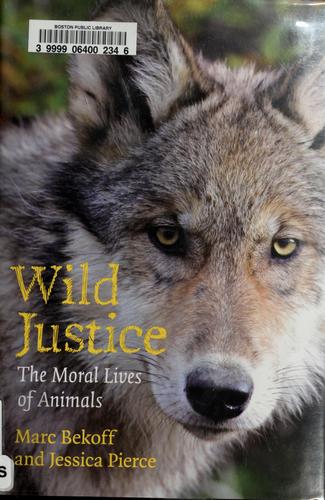UdeRecife reviewed Wild justice by Marc Bekoff
Review of 'Wild justice' on 'Goodreads'
3 stars
If you are familiar with the works of the likes of Frans de Waal, Edward O. Wilson, Jane Goodall, [insert name of reputed ethologist/biologist], the subject matter of this book will not come to you as a surprise. In a way, its premisse, that of animals having a sense of justice, morality, fairness, all being evolved traits, is just a given. However, when you start to read the book, you know you are not the primary target audience of its message.
The book presents its case in defense of the notion of Wild Justice, a sense of justice, morality, fairness that some social animals have, thus blurring even more the lines that separate the human animal from all other non-human animals. The case is more philosophical, or theoretical, than practical; that is, the authors rely on the works of primatologists, ethologists, biologists, etc, to draw conclusions allowing them to question …
If you are familiar with the works of the likes of Frans de Waal, Edward O. Wilson, Jane Goodall, [insert name of reputed ethologist/biologist], the subject matter of this book will not come to you as a surprise. In a way, its premisse, that of animals having a sense of justice, morality, fairness, all being evolved traits, is just a given. However, when you start to read the book, you know you are not the primary target audience of its message.
The book presents its case in defense of the notion of Wild Justice, a sense of justice, morality, fairness that some social animals have, thus blurring even more the lines that separate the human animal from all other non-human animals. The case is more philosophical, or theoretical, than practical; that is, the authors rely on the works of primatologists, ethologists, biologists, etc, to draw conclusions allowing them to question the long standing assumptions that morality is an exclusive human characteristic.
The text tends to be a bit repetitive, as if taking you through a revolving door with the same idea popping up again and again. Is it intentional? Or is this the outcome of having the text composed by two separate authors? Either way, it's not as bad as it sounds. If you're unfamiliar with its subject matter, the repetitions allow to give a second (or third, fourth, ...) thought about the issues at hand.
Now, does it deserve a reading? If you are familiar with the biology/ethology field, maybe not. But if you have a philosophical bent and like to explore the ethical dimensions open up by the current consensus on the animal behavior front, than this book is for you. For in it you’ll have a good summary of the observations, experiences, hypotheses and conclusions on animal behavior research.

